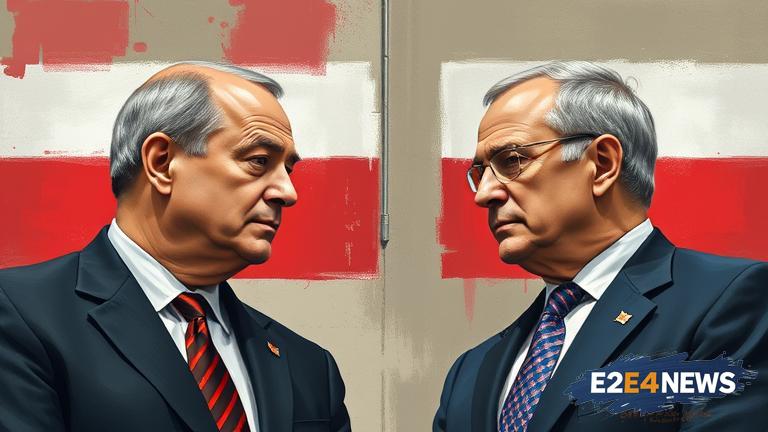Poland’s president, Karol Nawrocki, and opposition leader, Donald Tusk, have found themselves at odds over the country’s defense policy, a dispute that has significant implications for the nation’s security and its relationships with NATO allies. The controversy centers around the role of the president in shaping defense policy, with Nawrocki arguing that the head of state should have greater control over the military. Tusk, on the other hand, believes that the government should maintain its current level of authority over defense matters. The debate has sparked concerns about the potential for political instability and the impact on Poland’s relationships with its European partners. Poland has been a key player in regional defense initiatives, and any changes to its policy could have far-reaching consequences. The country’s military has been modernizing in recent years, with a focus on increasing its capabilities and interoperability with NATO forces. However, the dispute between Nawrocki and Tusk has raised questions about the direction of these efforts and the potential for political interference in military decision-making. The opposition has accused Nawrocki of attempting to consolidate power and undermine the government’s authority, while the president’s supporters argue that he is simply trying to ensure that Poland’s defense policy is aligned with its national interests. The issue has also sparked a wider debate about the role of the president in Polish politics, with some arguing that the head of state should have greater powers and others believing that the government should maintain its current level of authority. The dispute has significant implications for Poland’s relationships with its European partners, particularly in the context of NATO. The alliance has been working to strengthen its collective defense capabilities, and any changes to Poland’s defense policy could impact its ability to contribute to these efforts. Poland has been a key player in regional defense initiatives, and its military has been modernizing in recent years to increase its capabilities and interoperability with NATO forces. The country has also been a strong supporter of NATO’s eastern flank, and any changes to its defense policy could have significant implications for the region’s security. The debate between Nawrocki and Tusk has also raised questions about the potential for political instability in Poland, particularly in the context of the country’s upcoming elections. The opposition has accused the government of attempting to use the defense policy dispute as a way to distract from its own policy failures, while the president’s supporters argue that the issue is a legitimate concern that needs to be addressed. The dispute has sparked a wider debate about the role of politics in shaping defense policy, with some arguing that the military should be free from political interference and others believing that the government should have a greater say in defense matters. The issue has significant implications for Poland’s security and its relationships with its European partners, and it is likely to remain a major point of contention in the coming months. Poland’s defense policy has been a subject of debate for several years, with the country’s military modernization efforts and its relationships with NATO allies being key areas of focus. The dispute between Nawrocki and Tusk has added a new layer of complexity to these discussions, and it is likely to have significant implications for the country’s security and its relationships with its European partners. The country’s military has been working to increase its capabilities and interoperability with NATO forces, and any changes to its defense policy could impact its ability to contribute to regional defense initiatives. The debate has also raised questions about the potential for political instability in Poland, particularly in the context of the country’s upcoming elections. The opposition has accused the government of attempting to use the defense policy dispute as a way to distract from its own policy failures, while the president’s supporters argue that the issue is a legitimate concern that needs to be addressed. The dispute has sparked a wider debate about the role of politics in shaping defense policy, with some arguing that the military should be free from political interference and others believing that the government should have a greater say in defense matters. The issue has significant implications for Poland’s security and its relationships with its European partners, and it is likely to remain a major point of contention in the coming months. The country’s defense policy has been a subject of debate for several years, with the country’s military modernization efforts and its relationships with NATO allies being key areas of focus. The dispute between Nawrocki and Tusk has added a new layer of complexity to these discussions, and it is likely to have significant implications for the country’s security and its relationships with its European partners.





